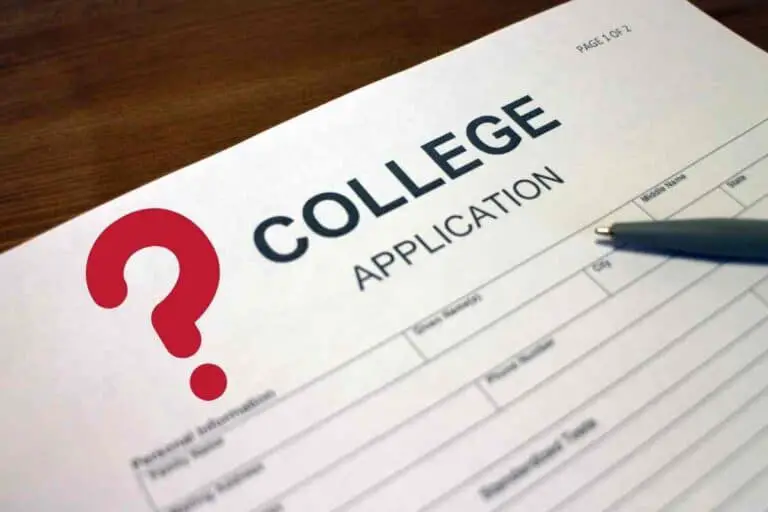Do Professors Bump Up Grades?
So you’re nearing the end of the semester, and you realize your grade may not be where you want it to be. When this happens, it’s tempting to reach out to your professor about bumping your grade up. However, will they actually do it for you?
Professors usually won’t bump up grades when you ask them, and you need to take care of the way you ask too. In many cases, your professor will feel offended at the request, especially if you haven’t shown up much throughout the semester or applied yourself during class.
In this article, I’ll explain when and if professors will bump up grades. I’ll also discuss whether or not you should talk to your professor, how you should do it, and you’ll leave here with a sample email to try out if needed.

When Will Professors Bump Up Grades?
While some professors won’t bump grades under any circumstance, others may bump a student’s grade to the next level if they meet a few requirements. If you’ve attended class often or if you’ve applied yourself above and beyond what other students have done, then you might have a chance.
For example, a student sitting at 89.9% and has maintained solid attendance and class participation is far more likely to be bumped up than the student sitting at 58% who rarely showed up for class.
Your professor will likely outline their grading policy in the syllabus at the beginning of the semester. Unless the syllabus exclusively states that they won’t bump any grades up, it’s safe to assume you can ask if you feel you deserve it.
It’s also worth noting that many professors grade on a curve anyway, so that will affect their decisions about bumping someone up to the next letter grade. Before reaching out to your professor, make sure you skim over the syllabus again to ensure you aren’t putting your foot in your mouth by asking for a grade bump.
Should I Talk to My Professor About My Grade?
You should speak to your professor whenever you feel you received a grade you don’t think you deserved. The marks you receive on each paper and exam will affect your overall grade in the class.
If you’re genuinely trying and you’re confused about why you received a particular mark, talking with your professor will provide clarity at the very least.
If you do decide to talk to your professor about your grade, you should do so politely. You should also go into it with the intention of understanding what to do to improve in the future, rather than just changing the grade in the now.
How To Ask a Professor To Review Your Grade
Before you even think about reaching out to your professor, you need to review the syllabus thoroughly to ensure there aren’t any policies in place that prohibit grade bumping. Once you’ve thoroughly gone over the rubric and grading policies, you can reach out to your professor if necessary.
Take care to follow these steps when asking your professor to review your grade:
- Familiarize yourself with their grading process. Each professor grades differently, and some may automatically grade on a curve. If your professor already grades this way, it’s unlikely they’ll bump you to the next letter.
- Decide if it’s worth your time to dispute. Unless you’re on the verge of failing or you’re a minuscule amount away from an A, disputing your grade may not be worth your time. Consider what your main priorities are and take it from there.
- Consult the syllabus for answers first. Professors will lay out most grading policies in a class syllabus at the beginning of the year. These policies include late assignments, potential grade curving, and possibly even a rule about bumping too.
- Review assignment instructions. For assignments in question, review the instructions again. If you find that you followed each prompt and you still don’t agree with your grade, dispute it.
- Read any comments. Usually, a professor will leave comments on assignments, especially if it’s an exam or paper. Reading professor comments will give you a good idea of why they graded your work a certain way.
- Check for errors. Use a search engine or compare your work with your friends. Doing this will help you see whether or not the professor made a mistake on the grade.
- Set an appointment if necessary. You should wait 24 hours before reaching out, so you have adequate time to check your work yourself first.
Source: Wikihow
In some cases, your professor may require you to submit a written rebuttal to dispute your grade. If this is the case, your rebuttal should include all of the reasons why you believe your assignment should have received a higher grade.
It should also include some kind of proof that your assignment followed all instructions set by the professor. Be respectful during the meeting and inquire as to how you can improve in the future.
You can also ask about any possible ways to help your overall grade if possible.
Sample Email To Professor About Grades
If you’ve decided you want to reach out to your professor to review your grade, consider using this sample email:
“Good [morning/afternoon/evening],
I was wondering if you had any availability this week to meet with me. I’m concerned about my grade on the most recent [exam/assignment/etc..]. My schedule is open during the afternoon at any time during the week.
Thank you, and I’m looking forward to hearing back from you soon.
[YOUR NAME]”
This template is short and sweet without being too vague.
You express your concern about your grade without outright claiming you believe the professor was wrong or you’re entitled to a higher grade. Of course, you should edit the sentence about scheduling to fit your schedule better and fill in the blanks where necessary.
Parting Thoughts
Unless you’re on the very verge of passing or failing, or you’re .1% away from an A, disputing your grade may not be worth it. Disputing your grade also runs the risk of tainting your professor’s impression of you, which may make it difficult if you need a letter of recommendation later on.
However, you should never be afraid to speak to your professor when you’re concerned. As long as you approach the situation calmly and respectfully, your professor will be more than willing to sit down with you and give some clarity.
Recommended Reading:






